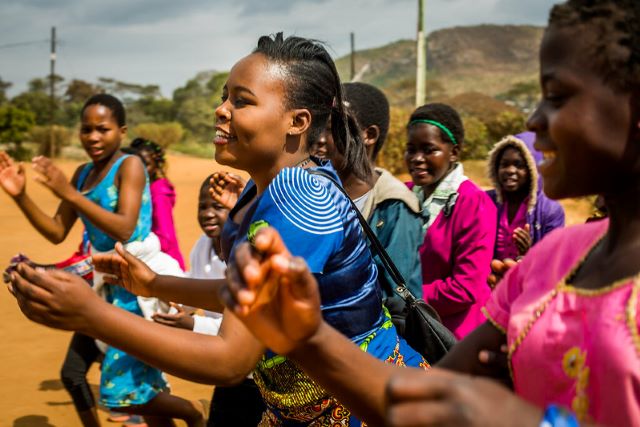Preventing Harmful Practices in Malawi
 Despite the enactment of the Gender Equality Act in 2013, Malawi has much more to accomplish with respect to women’s rights. Traditional customs and harmful cultural practices are still deeply entrenched in Malawian society, leading to discrimination and marginalization of women and girls. These practices adversely affect their development, health, socioeconomic status and overall contributions to society. UNICEF defines harmful practices as discriminatory practices that transcend into communities and societies’ cultures and are viewed as acceptable. The most common harmful traditional and cultural practices include female genital mutilation (FGM), Gender-Based Violence (GBV) and child marriage. Such practices perpetuate gender inequalities, violate women’s rights and have detrimental physical and emotional effects on women. The Tilimbike Safe Community Space aims to reduce harmful practices in Malawi that affect women and girls.
Despite the enactment of the Gender Equality Act in 2013, Malawi has much more to accomplish with respect to women’s rights. Traditional customs and harmful cultural practices are still deeply entrenched in Malawian society, leading to discrimination and marginalization of women and girls. These practices adversely affect their development, health, socioeconomic status and overall contributions to society. UNICEF defines harmful practices as discriminatory practices that transcend into communities and societies’ cultures and are viewed as acceptable. The most common harmful traditional and cultural practices include female genital mutilation (FGM), Gender-Based Violence (GBV) and child marriage. Such practices perpetuate gender inequalities, violate women’s rights and have detrimental physical and emotional effects on women. The Tilimbike Safe Community Space aims to reduce harmful practices in Malawi that affect women and girls.
Harmful Practices in Malawi
As a result of cultural practices, gender disparities remain pervasive across all aspects of society. Child marriage is a fundamental violation of human rights, with cascading consequences for young girls. For example, girls married as children are more likely to drop out of school, become teenage mothers and have higher rates of maternal mortality.
Malawi has one of the highest rates of child marriage in Africa, with the Human Rights Watch estimating that in 2020, one out of two girls will be married by the time they turn 18.
In addition to child marriage, Malawi remains a setting where gender-based violence is prevalent. One in five young women experiences sexual violence before they turn 18 and nearly 40% of married women have experienced intimate partner violence.
While adequate policies exist, the public and non-governmental sector responses have faced challenges in breaking down discriminatory cultural ideals and improving women’s rights. Harmful practices toward women continue unabated in Malawi due to the persistence of cultural attitudes. However, in rural communities, mentoring has proven to be efficacious in preventing harmful practices and empowering young girls and women.
Tilimbike Safe Community Space
The Tilimbike Safe Community Space is a mentorship program led by The Spotlight Initiative that serves at-risk girls and women in rural communities in Malawi by trying to eliminate harmful practices such as sexual and gender-based violence and child marriage. In mentorship sessions, mentors teach young girls about their basic human rights, sexual and reproductive health and other critical life skills. With this knowledge and interactions with their peers, girls are empowered to speak out and challenge harmful cultural practices.
Tilimbike Safe Community Space has 360 mentors, spanning across the high-risk districts of Dowa, Ntchisi, Mzimba, Nkatabay, Machinga and Nsanje. The program has educated and empowered more than 7,000 young women in these regions by equipping them with knowledge and skills to challenge the harmful practices that fuel GBV in their communities. The women and girls are now apt to speak out in their own communities, with crucial knowledge such as the importance of staying in school and the adverse effects of early marriage. Empowering girls and women is the first step toward change and fostering the foundation for solutions to these harmful practices.
Tilimbike During COVID-19
During COVID-19, women and girls are more confined to their homes due to school closures and travel restrictions. Therefore, they are at increased risk for GBV, teenage pregnancy and being coerced into childhood marriage. Despite the elevated risks, mentees of the Tilimbike Safe Community Space successfully prevented these harmful occurrences. Huge strides have been made to end the harmful cultural practices during COVID-19 restrictions, with no teenage pregnancies or child marriages among the mentees during the lockdown.
These women and girls have renewed hope for achieving their life goals and have enhanced their ability to make informed decisions about their lives and futures. The mentors in the Tilimbike Safe Community Space allow girls and women an opportunity to receive advice and support outside their home to reach their fullest potential. The Tilimbike Safe Community Space illuminates that mentorship programs are effective in breaking down cultural barriers and ending harmful practices.
Further Progression
Initiatives such as the Tilimbike Safe Community Space play a key role in eliminating dismantling gender disparities in society caused by cultural barriers. Mentoring and empowering women and girls will advance not just Malawi but the entire world.
– Samantha Johnson
Photo: Flickr
